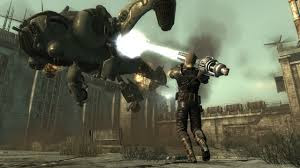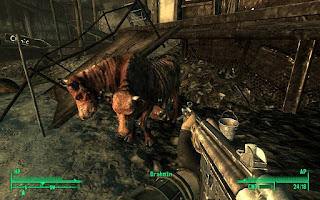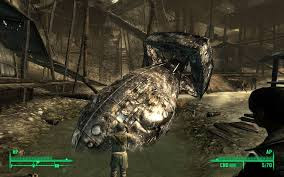Information:
Fallout 3 worth playing and replaying. It's deep and mesmerizing, and though not as staggeringly broad as the developer's previous games, it's more focused and vividly realized.This focus is obvious from the first hour of the game, in which character creation and story exposition are beautifully woven together. It's an introduction best experienced on your own rather than described in detail here, but it does set up Fallout 3's framework: It's the year 2277, and you and your father are residents of Vault 101, one of many such constructs that shelter the earth's population from the dangers of post-nuclear destruction. When dad escapes the vault without so much as a goodbye, you go off in search of him, only to find yourself snagged in a political and scientific tug of war that lets you change the course of the future. As you make your way through the decaying remnants of the District and its surrounding areas (you'll visit Arlington, Chevy Chase, and other suburban locales), you encounter passive-aggressive ghouls, a bumbling scientist, and an old Fallout friend named Harold who has, well, a lot on his mind. Another highlight is a diminutive collective of Lord of the Flies-esque refugees who reluctantly welcome you into their society, assuming that you play your cards right.
The city is also one of Fallout 3's stars. It's a somber world out there, in which a crumbling Washington Monument stands watch over murky green puddles and lurching beasts called mirelurks. You'll discover new quests and characters while exploring, of course, but traversing the city is rewarding on its own, whether you decide to explore the back rooms of a cola factory or approach the heavily guarded steps of the Capitol building. In fact, though occasional silly asides and amusing dialogue provide some humorous respite, it's more serious than previous Fallout games. It even occasionally feels a bit stiff and sterile, thus diminishing the sense of emotional connection that would give some late-game decisions more poignancy. Additionally, the franchise's black humor is present but not nearly as prevalent, though Fallout 3 is still keenly aware of its roots. The haughty pseudogovernment called the Enclave and the freedom fighters known as the Brotherhood of Steel are still powerful forces, and the main story centers around concepts and objectives that Fallout purists will be familiar with.
Although some of that trademark Bethesda brittleness hangs in the air, the mature dialogue (it's a bit unnerving but wholly authentic the first time you hear 8-year-olds muttering expletives) and pockets of backstory make for a compelling trek. There are more tidbits than you could possibly discover on a single play-through. For example, a skill perk (more on these later) will enable you to extract information from a lady of the evening, information that in turn sheds new light on a few characters--and lets you complete a story quest in an unexpected way. A mission to find a self-realized android may initiate a fascinating look at a futuristic Underground Railroad but a little side gossiping might let you lie your way to quest completion. There aren't as many quests as you may expect, but their complexity can be astonishing. Just be sure to explore them fully before pushing the story forward: Once it ends, the game is over, which means that you'll need to revert to an earlier saved game if you intend to explore once you finishe the main quest.
Thus choices are ruled only by your own sense of propriety and the impending results. For every "bad" decision you make (break into someone's room, sacrifice a soldier to save your own hide), your karma goes down; if you do something "good" (find a home for an orphan, give water to a beggar), your karma goes up. These situations trigger more consequences: Dialogue choices open up, others close off, and your reputation will delight some while antagonizing others. For example, a mutant with a heart of gold will join you as a party member, but only if your karma is high enough, whereas a brigand requires you to be on the heartless side. Even in the last moments of the game, you are making important choices that will be recounted to you during the ending scene, similar to the endings in the previous Fallout games. There are loads of different ending sequences depending on how you completed various quests, and the way they are patched together into a cohesive epilogue is pretty clever.
Fallout 3 remains true to the series’ character development system, using a similar system of attributes, skills, and perks, including the S.P.E.C.I.A.L. system from previous games for your attributes, such as strength, perception, and endurance. From there, you can specialize in a number of skills, from heavy weapons and lock-picking to item repairing and terminal hacking. You will further invest in these skills each time you level, and you'll also choose an additional perk. Perks offer a number of varied enhancements that can be both incredibly helpful and a bit creepy. You could go for the ladykiller perk, which opens up dialogue options with some women and makes others easier to slay. Or the cannibal perk, which lets you feed off of fallen enemies to regain health at the risk of grossing out anyone who glimpses this particularly nasty habit. Not all of them are so dramatic, but they're important aspects of character development that can create fascinating new options.The game starts with the main character as a newborn, whereupon the player determines the race, gender, and the general appearance of their character. As a one-year-old baby, the infant reads a child's book titled You're SPECIAL, where the player can set the character's starting S.P.E.C.I.A.L. primary attributes: Strength, Perception, Endurance, Charisma, Intelligence, Agility, and Luck. The character gains a set of Skills with base levels determined by these attributes. At age 10, the character obtains a Pip-Boy, a computerized wristwatch which allows the player to access a menu with statistics, maps, data, and items. The character also obtains their first weapon, a BB gun. At age 16, the character takes the Generalized Occupational Aptitude Test (G.O.A.T.) to determine the three Skills they wish the character to focus on
As the character progresses through the game, experience points are earned that are used to achieve levels of accomplishment. Upon achieving a new level, the player receives a set of skill points that can be assigned to improve any of the Skill percentages. For instance, increasing the lock pick skill grants the player the ability to pick harder locks to unlock doors and supply crates. A Perk is granted at each level, which offers advantages of varying quality and form. Many Perks have a set of prerequisites that must be satisfied, and new Perks are unlocked every two levels.








No comments:
Post a Comment